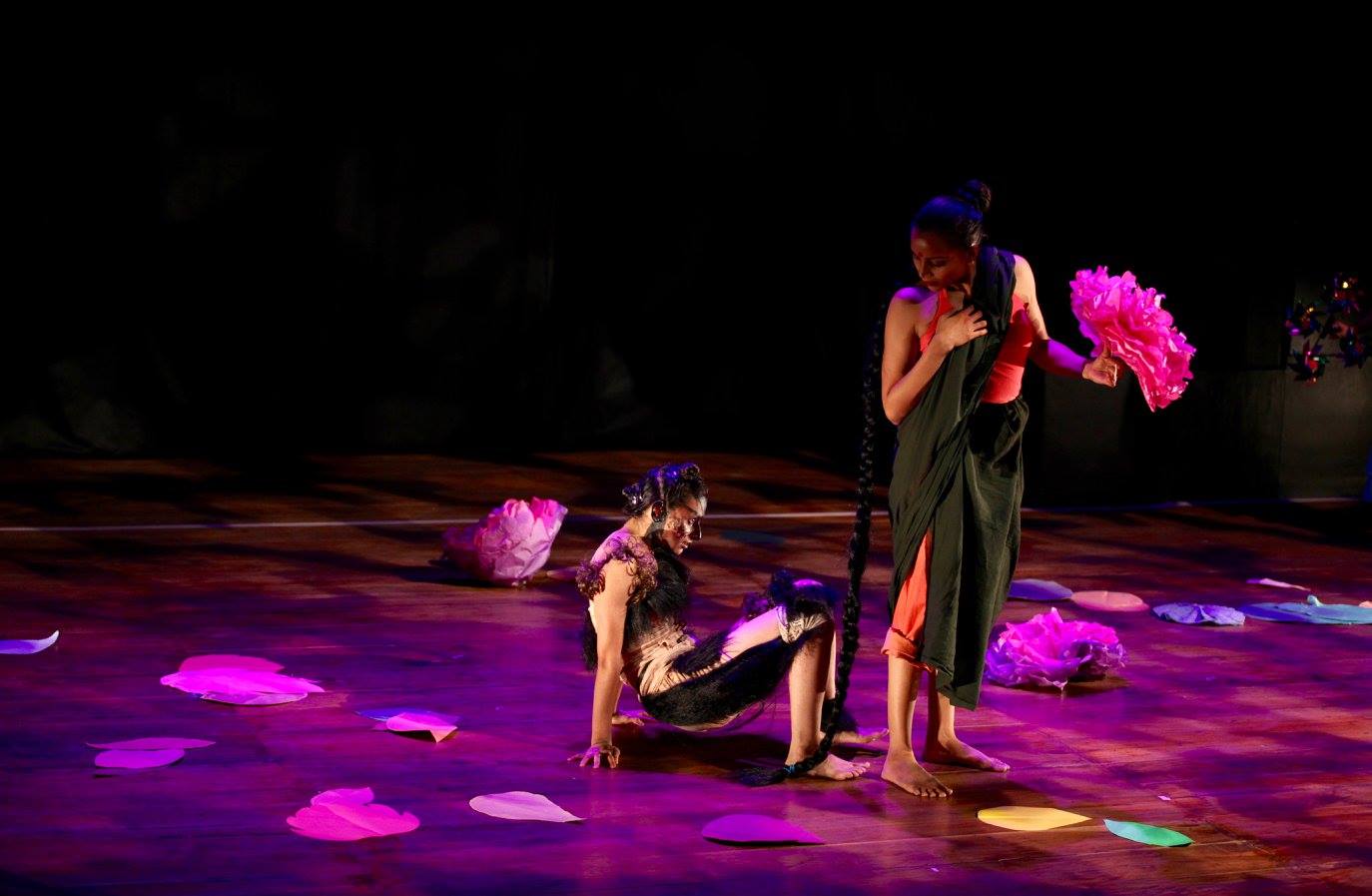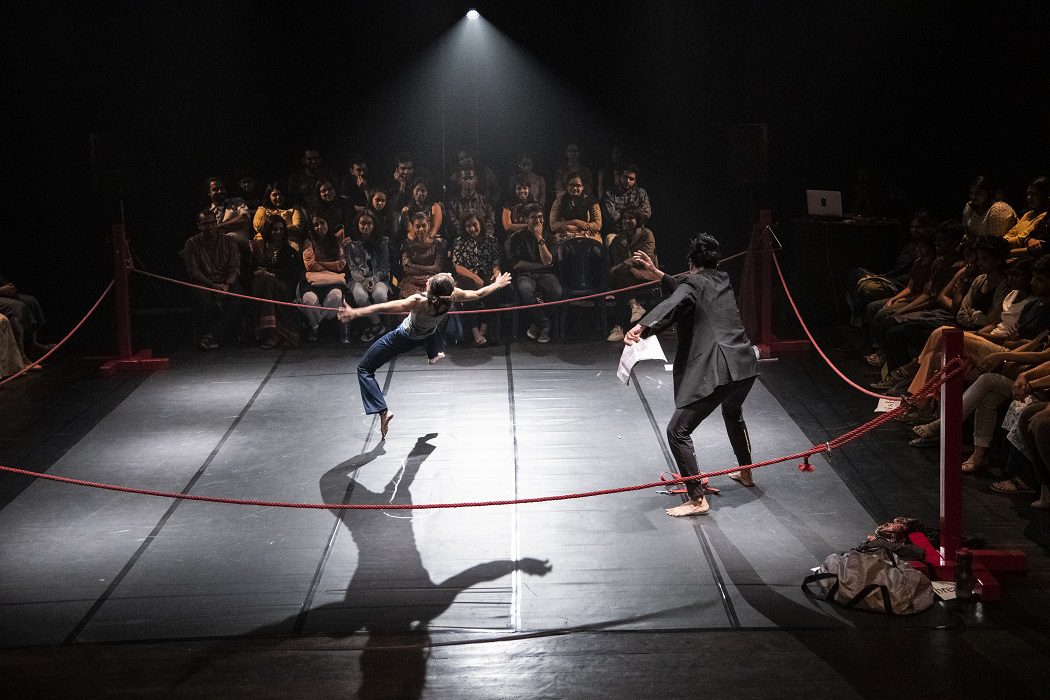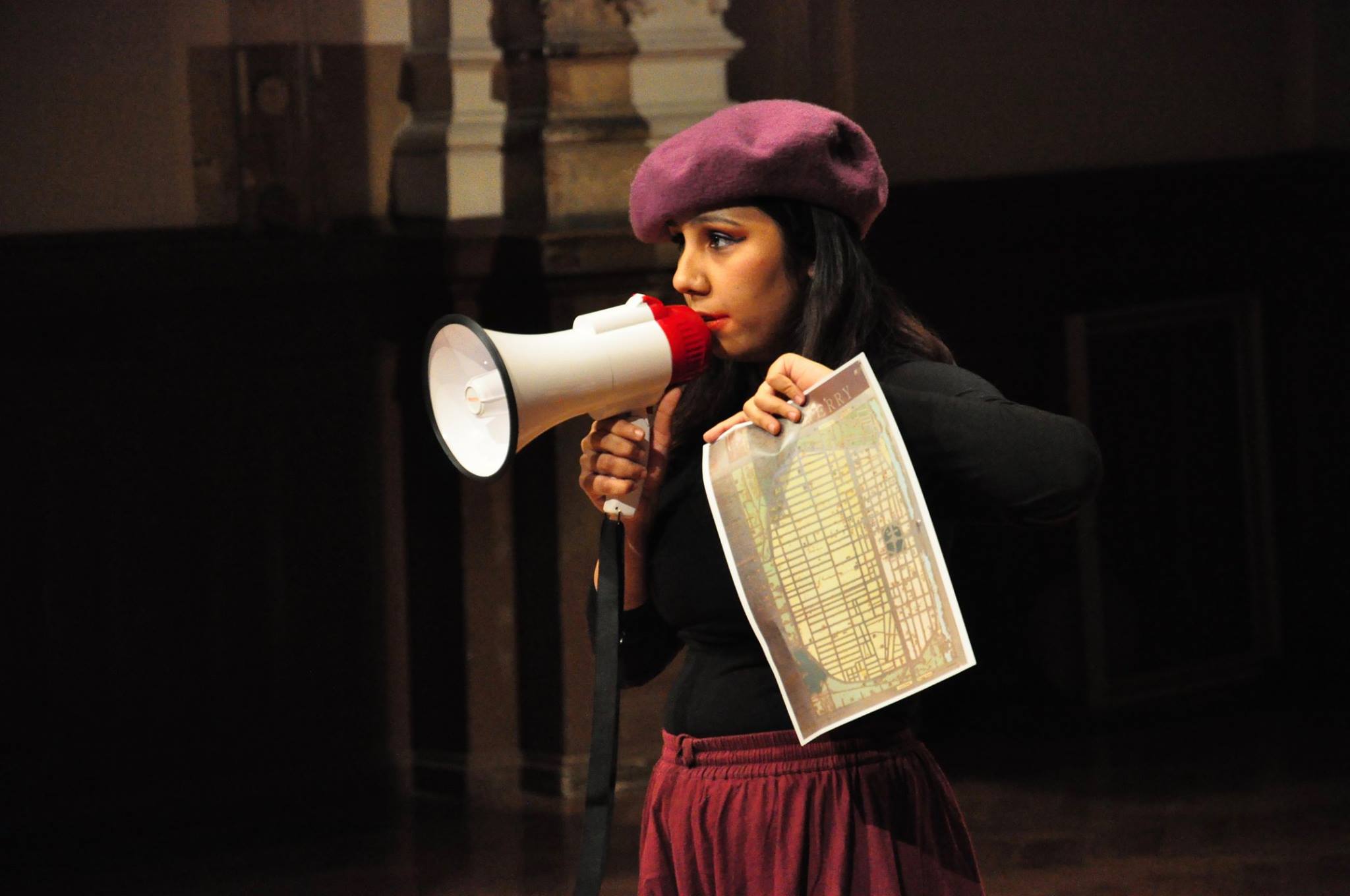(October 3, 2021) It’s eerily dark and quiet. The strums of the guitar break the silence as they swiftly fill the space with heightened drama. Following in the footsteps of the intense music, the spotlight finds itself warming up the center of the stage that has a woman sitting on her haunches. She enacts pulling down her pyjamas to pee only to find her young niece sitting across her seeing pubic hair for the first time. The lights dim out, and the next chapter unfolds. A strong Sikh man prepares for his routine circus feat of pulling a truck with his long plait in front of a thrilled audience. He exaggerates each step with loud gestures but ultimately fails to pull it off. It’s the exploration of sexuality through hair that makes Bengaluru-based theatre director Deepika Arwind‘s play A Brief History of Your Hair a thought-provoking watch.
The 35-year-old is among the few voices in the sphere of Indian feminist theatre who is experimenting with narratives to tell stories that highlight gender issues. “For the longest time, theatre has been performing dated work that’s borrowed from colonial Europe. It’s time that the world hears the voice of contemporary Indian women,” she tells Global Indian in an exclusive interview.

A Brief History of Your Hair (Photo courtesy: Virginia Rodrigues)
It was in the 70s that feminist theatre narratives first emerged in the country as a response to male-centric discourses. A perfect amalgamation of art and activism, Indian feminist theatre not just highlighted women’s issues but encouraged more women to enter the world of drama as writers and artistes. While the genre has found a strong footing in the last few decades with an authentic portrayal of women and their sexuality on stage, the lack of representation is still bothersome.
“There is a lack of representation in theatre – not just in terms of voice and stories. Even not many women playwrights are seen in India especially in the English language. As a woman living in South Asia, I have had my share of experiences and I put them on stage. I am not an activist on stage but it’s the craft and form that’s involved in my work,” adds Arwind.
For someone who began her journey more than a decade ago, Arwind has become a known face in contemporary theatre.

A still from the play I Am Not Here. (Photo Courtesy: Aparna Nori)
Vivid imagination led to a creative dream
Born and raised in a Sikh family in Bengaluru to a doctor mother and a civil engineer father, Deepika Arwind was very much of a performer as a kid. “I had a very vivid imagination and I loved being in the spotlight,” Arwind reveals. While Arwind loved performing for her family and friends, her tryst with theatre began when one of Bengaluru’s well-known theatre personalities Ratan Thakore Grant visited her drama class in National Public School when she was seven. This was enough of a kick-starter for a young Arwind but it wasn’t until her college days that Arwind immersed herself in the performing arts.
The mandate of producing a theatre production for her Mass Communication course in Christ College led her to a path that was set to become her destiny. Her very first production Dreaming About Me in collaboration with Thespo, a youth theatre movement cast a spell on the audience. Such was the reception that it soon made its way to a full house in Bengaluru’s Ranga Shankara and later at the National Centre for Performing Arts in Mumbai.
“My years at Christ College were full of theatre. After wrapping up my classes at 4 in the evening, I would rush to do theatre. I really enjoyed the process and I would act in many productions at that time,” she adds.

Unlisted by Liz-Ann D’Souza
Her time at Christ College helped Arwind hone her skills in performing arts. After graduation, Deepika Arwind moved to Chennai to pursue her Master’s in Print Journalism from the Asian College of Journalism but her love for theatre kept her afloat. “Since college was hectic, I couldn’t perform during that one year but I did write a lot about plays that were happening in Chennai at that time.”
Dreams culminate into a beautiful reality
The next two years were spent working with The Hindu covering art and culture. But this time in the newspaper made Arwind realize how much she missed theatre, especially after she won the Toto Award for Writing (poetry and fiction) in 2011. So she quit her job to pursue her passion. In 2013, she formed a theatre collective The Lost Post Initiative to collaborate with varied artistes for her productions. Her directorial debut Nobody Sleeps Alone lit up Jagriti Theatre in Bengaluru as it was a perfect homage to Bollywood’s gangster movies of the 70s and 80s. The play was performed far and wide in the country and turned out to be the perfect flight for this fledgling theatre collective. Such was the impact of the play that it was soon shortlisted for The Hindu Playwright Award 2013.
Gender bender
2015 saw another production A Brief History of Your Hair from the artiste. What began as a 15-minute piece at Gender Bender with the help of a trigger grant from the India Foundation for the Arts and the New Voices Arts Project soon translated into a beautiful storybook with six chapters that uses music, dance, theatre, and projected poetry to explore hair that’s a marker of social and cultural anxieties surrounding gender, sexuality, caste, and religion.

Deepika Arwind in White Rabbit Red Rabbit
Being someone who doesn’t feel bound by geography, Arwind’s plays soon found themselves on international platforms. Her children’s play One Dream Too Many was invited to the International Playwright’s Intensive at The Kennedy Centre, Washington DC, and the University of Maryland.
Her next production, No Rest In The Kingdom, a solo piece that has Arwind playing four characters is a dark comedy about how women deal with misogyny and patriarchy. A play that came into existence out of the need to have a conversation about daily misogynies, No Rest in Kingdom confronts inherent prejudices. Packed with humor and vignettes of sexism, the play takes it to form as a collection of shared and personal experiences. “It’s a feminist voice coming into its mean. I wanted to connect with the audience through humor and didn’t want it to be preachy,” adds the 35-year-old.
The show took her to Uganda in Africa. “It generated quite an interest among the international theatre circle and soon my work was traveling across the globe,” reveals Arwind. After making the right noise in the US and Africa with her work, Deepika Arwind took off to Berlin in 2018 with her new play I am Not Here, a dark and funny production designed as an 8-step guide in how to censor women’s writing. Such was the reception that it was shortlisted for the Stuckemarkt, Theatretreffen.

Deepika Arwind at Ballhause Naunynstrasse (an independent theatre in Berlin) for Permanente Beunruhigung (Photo courtesy: Wagner Caravalho)
Art form awaiting its due
Things were running smoothly until the pandemic put the world on standstill, and contemporary art was majorly affected. “Contemporary art doesn’t get it due. Especially the pandemic hit the artistes badly. For many, it’s the only means of livelihood and with no shows, it did hit them hard. Interestingly, people turned to art, be it films or music, or online shows during the pandemic. I think it’s time to give back to the artistes,” she adds.
But Arwind is hopeful that things will get back on track soon as she has already started prepping up for her plays that are set to enthrall the audience in Germany, Switzerland, and the UK next year. The contemporary artiste, who calls herself a theatre-maker, loves telling stories that start a dialogue but says that she has an identity beyond the realm of theatre.
“Theatre is not who I am. I have an identity beyond theatre. I would say we are like railways tracks, always coming together and then moving away,” she signs off.



